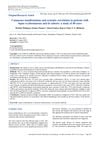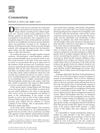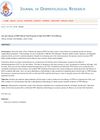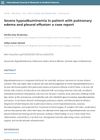 September 2020 in “International Journal of Research in Medical Sciences”
September 2020 in “International Journal of Research in Medical Sciences” People with alopecia areata had lower vitamin D levels, but these levels did not relate to how severe their condition was.
 1 citations,
January 2020 in “Recent Research in Genetics and Genomics/Recent Research in Genetics and Genomics ”
1 citations,
January 2020 in “Recent Research in Genetics and Genomics/Recent Research in Genetics and Genomics ” High doses of Lepidium sativum seed extract are toxic and should be used with caution.
 February 2024 in “ACS Omega”
February 2024 in “ACS Omega” The Shen Bai Hair Growing Decoction may help treat hair loss by promoting hair growth and reducing inflammation.
 April 2024 in “Histochemistry and cell biology”
April 2024 in “Histochemistry and cell biology” N-acetylcysteine may prevent hair loss caused by chemotherapy.
68 citations,
October 2008 in “Archives of dermatological research” Generalized vitiligo in Chinese patients is linked to other autoimmune diseases, especially in familial cases.
 December 2022 in “한국 미생물 생명공학회지”
December 2022 in “한국 미생물 생명공학회지” TS-SCLF from fermented Schisandra chinensis may promote hair growth and improve hair quality.
 1 citations,
October 2021 in “International Journal of Research in Dermatology”
1 citations,
October 2021 in “International Journal of Research in Dermatology” Alopecia areata mainly affects men aged 21-40 and is linked to autoimmune issues, thyroid problems, and inflammation.
 August 2018 in “International Journal of Research in Dermatology”
August 2018 in “International Journal of Research in Dermatology” Skin issues like hair loss, rash, and sensitivity to sunlight are key signs of lupus activity.
 August 2023 in “Benha Journal of Applied Sciences”
August 2023 in “Benha Journal of Applied Sciences” COVID-19 survivors working in healthcare may experience temporary hair loss.
 March 2001 in “Clinics in Dermatology”
March 2001 in “Clinics in Dermatology” Hair disease research is a growing and evolving field in dermatology, with recent significant advances.
 January 2024 in “International Research Journal Of Modernization In Engineering Technology And Science”
January 2024 in “International Research Journal Of Modernization In Engineering Technology And Science” Hair growth serums reduce hair fall and improve growth with mostly positive reviews.
 10 citations,
January 2019 in “Skin Research and Technology”
10 citations,
January 2019 in “Skin Research and Technology” Southern Chinese women with female pattern hair loss have less, thinner hair and smaller hair follicles.
 June 2024 in “International Journal for Research in Applied Science and Engineering Technology”
June 2024 in “International Journal for Research in Applied Science and Engineering Technology” Flaxseed hair gel is effective for hair growth and dandruff, is stable, and has minimal side effects.
 February 2021 in “International journal of men's social and community health”
February 2021 in “International journal of men's social and community health” Online forums help understand men's concerns about baldness and show the need for better support that changes how baldness is viewed.
 July 2020 in “International journal for research in applied science and engineering technology”
July 2020 in “International journal for research in applied science and engineering technology” The herbal shampoo made from local plants can reduce hair loss and promote hair growth.
 3 citations,
January 2021 in “Plastic and Aesthetic Research”
3 citations,
January 2021 in “Plastic and Aesthetic Research” Hair loss reduces hair thickness and coverage, but drug treatments mainly revive dormant hairs rather than reverse thinning; patients often undervalue their hair loss severity.
39 citations,
January 1980 in “Dermatology” Cyproterone acetate was effective in treating acne, hirsutism, and alopecia with few side effects.
May 2022 in “GLOBAL JOURNAL FOR RESEARCH ANALYSIS” COVID-19 can cause temporary hair loss.
 1 citations,
July 2022 in “Experimental dermatology”
1 citations,
July 2022 in “Experimental dermatology” The SHJH hr mice with a mutated Hr gene show signs of faster skin aging due to poor antioxidative protection.

γδTregs may help treat autoimmune diseases like alopecia areata by promoting hair regrowth and reducing immune attacks.
 2 citations,
June 2017 in “Journal of The American Academy of Dermatology”
2 citations,
June 2017 in “Journal of The American Academy of Dermatology” The type of PCOS a woman has doesn't strongly predict her skin or metabolic symptoms; obesity is a more important factor.
 June 2022 in “Rheumatology research”
June 2022 in “Rheumatology research” Lupus can be a rare cause of high calcium levels in the blood.
 7 citations,
January 1981 in “Springer eBooks”
7 citations,
January 1981 in “Springer eBooks” The document concludes that hair biology is complex and there are still unanswered questions about hair loss and follicle changes.
52 citations,
September 2017 in “Current Stem Cell Research & Therapy” Adipose-derived stem cells can help treat hair loss.
 4 citations,
March 2021 in “Parasitology Research”
4 citations,
March 2021 in “Parasitology Research” Besnoitiosis, a parasitic disease, has been found in donkeys in Italy and may be more common in Europe than previously thought.
 May 2023 in “Asian journal of research in pharmaceutical sciences”
May 2023 in “Asian journal of research in pharmaceutical sciences” Ketoconazole is effective for treating various fungal infections and has new uses in dermatology, but oral use can have serious side effects.
 January 2023 in “Cancer research, statistics, and treatment/Cancer research, statistics and treatment”
January 2023 in “Cancer research, statistics, and treatment/Cancer research, statistics and treatment” Vijaya successfully fought stage 2A breast cancer with surgery, chemotherapy, radiotherapy, and hormone therapy, while advocating for support groups.
 9 citations,
March 2022 in “Journal of radiation research”
9 citations,
March 2022 in “Journal of radiation research” Boron neutron capture therapy for head and neck cancer can cause side effects like mouth sores and skin irritation, which vary depending on where the treatment is aimed.
 January 2018 in “Journal of dermatological research”
January 2018 in “Journal of dermatological research” The document suggests a clinical trial to accurately determine if PRP is an effective treatment for a common type of hair loss in men.
 November 2024 in “International Journal of Research in Medical Sciences”
November 2024 in “International Journal of Research in Medical Sciences” Hypoalbuminemia can cause pleural effusion and needs careful treatment.


























